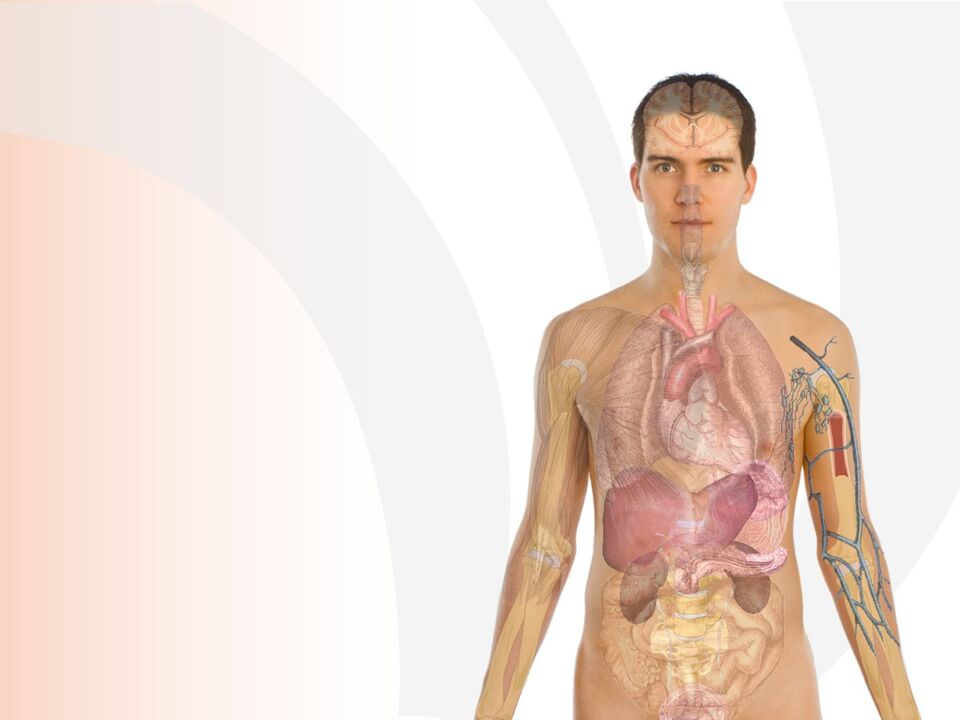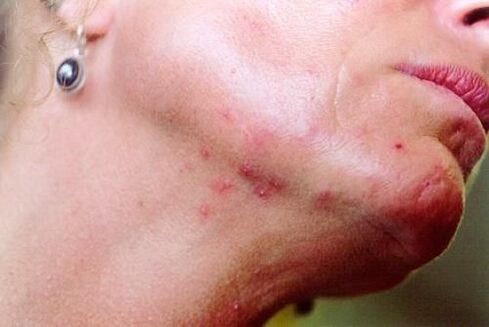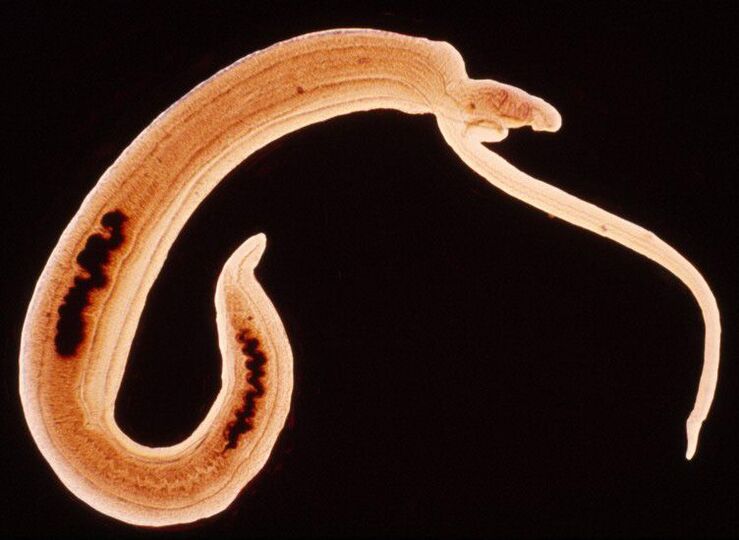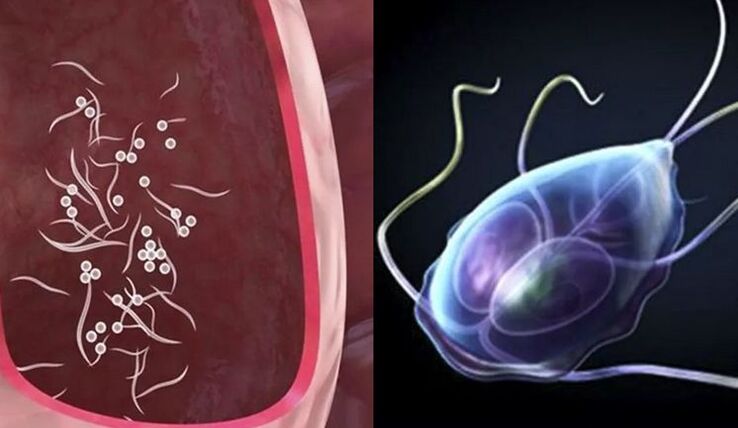The symptoms of worm infection are different. For example, the most common dyspeptic disorders are nausea, vomiting, pain and bloating in the abdomen. Some patients do not pay attention to the signs until they develop a rash that cannot be treated with conventional medicines. Helminthic invasion is often accompanied by symptoms similar to those of other diseases and allergies. Therefore, timely diagnosis is required.

Worm infection in humans
Most helminths spread to the human body by consuming unwashed fruits and vegetables. Once spread in the body, damage to organs occurs, causing serious illness. Pathologies of the liver, kidneys, heart, digestive system, gallbladder, and even oncology can develop.
Common symptoms are skin irritation and rash. But one may not pay attention to this for years while the pathology develops, although it is sufficient to take an anthelmintic drug for complete recovery.
Methods of infection
There are four ways for worms to enter the human body:
- Geohelminthiasis. The parasite enters the water through the soil left over from unwashed fruits and vegetables. Poor hand washing after working with the soil can also cause infection. Contact with the ground is often observed in animals that enter the house with dirty paws. Eggs, larvae and adults can enter the human body.
- Contact. In the host, the female lays 4-5 thousand eggs in 1 day. After contact, they can spread from one infected person to others, especially at home. Eggs or adults are spread with bed linen, towels, personal hygiene items. It is enough for an infected person not to wash their hands. Most often, this path is typical of pinworms, worms.
- Biohelminthiasis. Parasites are stored in the bodies of living and dead animals and fish. After that, one can eat them. Preservation of parasites is observed with inadequate heat treatment.
- Insect bites. In this way, the smallest size of helminth is transmitted.
Of all the forms of helminths, the infection is most commonly ingested by eggs and larvae. They can be found in soil, water, infected people, raw meat. Not only is it important to wash food and hands, but also to always apply heat treatment to food.

Symptoms of helminthiasis
The symptoms of the infection vary depending on the stage of the disease.The most common symptoms are:
- weight loss, thinness;
- pallor of the skin;
- itching in the anus.
The symptoms are similar to other pathologies, so the patient may use poor therapeutic methods. Symptoms may vary depending on the body area involved. For example, in case of liver damage, the skin turns yellow.
Gastrointestinal dysfunction
When pathogens enter the digestive tract, the following symptoms develop:
- violation of the formation of stool mass (constipation, diarrhea);
- itching in the anus;
- dyspeptic disorders - nausea, vomiting, abdominal pain, heartburn;
- colic in the intestines;
- bloating accompanied by swelling;
- periodic change in body weight from larger to smaller.
In the initial stage, the symptoms are almost invisible. The more the worms damage the internal organs, the more actively the symptoms develop. Some parasites are able to excrete foreign waste products into the body. This leads to severe poisoning and diarrhea. Large worms spread in the intestines, preventing the passage of feces. This causes constipation.
Due to the release of wormwood waste, man is exposed to severe poisoning. Therefore, weakness, malaise, dyspeptic disorders develop.
Immune suppression
When a person eats food, nutrients enter the body and are distributed in the tissues.The helminths eat them, so the patient develops the following abnormalities:
- hypovitaminosis;
- metabolic disease;
- suppression of the immune system.
People often get sick with viral, actor, fungal diseases. Hypovitaminosis does not resolve even with the use of multivitamin preparations until completion of anthelmintic therapy.
Neurological disorders
Certain types of helminths are able to damage the peripheral tissues of the nervous system by crossing the blood-brain barrier. These properties are possessed by the products of their poisoning.Damage to the nervous system causes the following symptoms:
- constant forgetfulness, bad memory;
- headache to migraine;
- dizziness;
- stress, neurosis, depression;
- increased fatigue.
The patient's behavior changes. He gets into a conflict with the people around him, forgets about his acquaintances. Gradually the symptoms increase, the body temperature rises by more than 39 degrees.

Chronic hypovitaminosis leads to chronic fatigue syndrome. The level of red blood cells gradually decreases, causing anemia. The person will be irritable and aggressive.
Respiratory disorders
Damage to the deepest parts of the airways can occur in the initial stages.The following pathologies develop:
- bronchitis, bronchitis;
- emphysema, bronchial asthma, pneumonia.
Common colds and pharyngitis can also be a sign of helminthic invasion.
Skin problems
Sufficient vitamins, trace elements and minerals are needed for the normal development of the epidermis. Worm infection leads to hypovitaminosis, which worsens the quality of the skin.The following differences appear:
- acne, acne, rash;
- itching, peeling, redness;
- peeling the nail plate.
Even the most severe skin pathologies can develop:
- urticaria, dermatitis;
- papilloma, seborrhea;
- allergic reaction.
Your doctor and patient may not immediately understand why medications do not help with these pathologies. The quality of the skin deteriorates significantly, it becomes pale and wrinkles appear. The turgor decreases, i. e. the surface tension.

Signs of infection depending on the type of helminths
The severity of the symptoms depends on the following factors:
- the number of parasites in the body;
- the degree of immune activity;
- localization of parasites;
- a kind of parasite.
Some helminths can remain in the host for a long time without causing negative symptoms. Other individuals are capable of immediate deterioration of health, liver damage. For example, tapeworm.
Wormwood
Ascaris damages many internal organs, causing certain symptoms, similar to other diseases.The following symptoms may occur:
- hyperthermia;
- prolonged cough;
- severe fatigue;
- bronchitis, pneumonia.
First, the digestive system is damaged, leading to hypovitaminosis and metabolic disorders. The human body is exhausted. Signs of gastrointestinal damage gradually appear:
- jaundice of the skin;
- ileus.
The spread of worms through the blood-brain barrier results in severe headaches, migraines, and depressive states.
Schistosomiasis, trichuriasis, ankylostomiasis, diphyllobothriasis
Parasites cause the following differences:
- lack of nutrients and vitamins;
- decreased metabolism, which causes a change in body weight;
- intestinal dysbiosis.
Gradually, hypovitaminosis becomes beriberi, leading to significant exhaustion of the body. A person's skin turns pale and can often pass out, which is typical of anemia.
Pinworms
Pinworms are characterized by the deposition of eggs in the anus, a process that usually occurs at night. Therefore, a person is worried about severe itching of the anus. The disease is characterized by intermittent remission, so sometimes the itching disappears. If left untreated, the helminthic invasion becomes extensive, so that the itching worries the patient at any time of the day.
Trichinosis
The parasite penetrates any part of the body, producing large amounts of toxins. This leads to constant cramps, cramps, muscle aches. Edema occurs due to damage to the cardiovascular system. In case of severe poisoning, the body temperature rises.
Fascioliasis, opisthorchiasis, clonorchiasis
It is one of the most dangerous intestinal worms, leading to the following lesions:
- liver difficulties with jaundice;
- intestinal obstruction, dyspeptic disorders when spreading along the gastrointestinal tract.
The patient gradually develops hepatosplenomegaly.
Urogenital schistosomiasis

Parasites actively spread in the urogenital system. As a result of the chronic inflammatory process, damage to the mucous membranes occurs. Therefore, when urinating, a person notices red urine, indicating the formation of bleeding foci.
Habitats of worms
In the human body, helminths can damage different types of organs:
- vlasoglav - colon;
- ascaris, tapeworm, hookworm - small intestine;
- tapeworm - liver.
Depending on the damaged organs, different symptoms develop:
- hepatic jaundice, pain in the right hypochondria, hepatitis;
- respiratory tract - trachea, bronchitis, pneumonia;
- brain - cramps, paraesthesia, fainting.
Simultaneous treatment of the disease (hepatitis, colitis) and removal of helminth samples are required.

Common helminth patterns
Scientists count a huge number of parasites in the human body. In total, there are more than 100 of them.But more often, doctors differentiate the infection with the following parasites:
- pinworm;
- dwarf tapeworm;
- tapeworm;
- hookworms;
- whipworm;
- paragonimiasis;
- cysticercosis.
Laboratory and instrumental diagnostics should be performed to determine the exact type of pathogen and to prescribe appropriate treatment. The patient is examined by a therapist first, and then feces are added to a coprogram to detect wormworms. Generally, therapists and infectious disease experts recommend that the test be performed twice, as eggs and larvae may not be detectable even in the presence of infection.
Laboratory blood tests are recommended for patients at risk:
- presence of pets;
- animal work;
- health workers;
- employees of childcare institutions;
- food workers.
Attention! An enzyme-linked immunosorbent assay is recommended for accurate identification of helminth and its toxic products. They are performed in city clinics and hospitals, as well as in private laboratories.
Therapeutic methods
Self-selection of drugs against helminths is prohibited as they strongly affect the condition of the liver and kidneys. It is recommended that you undergo an initial study, after which specific medications will be prescribed. The dose is selected depending on the person's health, age and weight.
The following drug delivery methods are selected:
- tablets - mild to moderate helminthiasis;
- injections, infusions - the severity of the disease, the development of an excessive number of parasites, severe damage to the digestive system.
Many drugs only affect adults. If there is a risk of eggs and larvae, it is better to take a second course of therapy or choose a stronger treatment.
The table shows the optimal drugs for treatment.
| Material | Influence |
| mebendazole | Completely destroys dumplings, hookworms, whipworms, tapeworms and other parasites |
| Pyrantela pamoate | The substance kills nematodes, effective in enterobiasis and necatorosis |
| Levamisole hydrochloride | It destroys spindle and hookworms |
| Pirvinia embonate | It helps to completely cure enterobiasis |
| Albendazole | Helps destroy most items in the adult or larval state. |
Initially, it is recommended to identify the exact pathogen, only then apply the drug. This increases the chances of recovery without adversely affecting the body.
Prevention methods
To prevent parasites from entering the body, follow the rules of prevention:
- washing hands after returning home, all day after contact with animals;
- use of personal hygiene items and utensils by one person only;
- taking multivitamins, giving up bad habits to strengthen the immune system;
- thorough washing of fruits and vegetables, heat treatment of meat and fish;
- use of good quality drinking water from a proven source.

Helmam samples are found in many products, so the risk of their spreading into the body cannot be ruled out. Anyone can become infected with the parasite without knowing it. It can spread from one family member to another through family contact. It is therefore necessary to apply preventive measures on a daily basis.
Proper care of the animals is important. They should be washed regularly and medicines from parasites given to reduce the risk of helminth infection.
If a person suspects they have been charged with helminths, it is better to have a laboratory test in time. This is repeated twice to avoid a false negative test. Self-administration of drugs is prohibited. Each has a strong, negative effect on the liver. Only a doctor can select the optimal anthelmintic with the right dosage. With timely treatment, the development of serious diseases and immunodeficiency can be prevented.
























